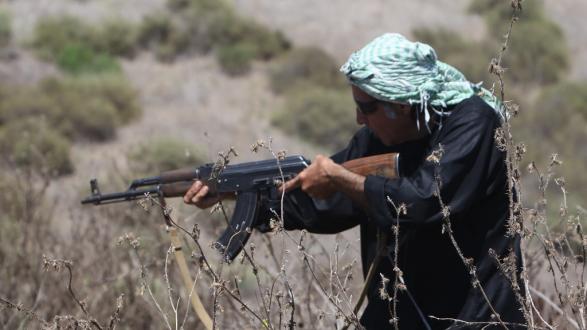In:
Global Beat is your weekly stop for news from around the world. Join us every Friday morning for important stories you should know about.
This week, the Taliban kills dozens in Afghanistan; Turkey turns to Russia amidst a currency crisis; Ebola outbreak in Congo worries officials; and more.
____________________
Americas
Officials say the United States and Mexico are close to agreeing on a new NAFTA deal, but the talks so far have excluded Canada. NAFTA negotiators from the United States and Mexico met this week to discuss details of the agreement, and many are saying "the two sides have largely agreed to new rules on auto trade—a top priority for the White House—that could boost investment in the United States and curb a flight of domestic production and jobs to Mexico." Canada is expected to return to the talks once the United States and Mexico have ironed out all disagreements.
Also check out:
- ‘They be pirates’: An old scourge is reappearing in the Caribbean as Venezuela collapses – The Washington Post
Central & South Asia
Dozens have been killed in recent Taliban attacks on Afghanistan military bases this week as fighting intensifies in northern Afghanistan. Seventeen soldiers were killed on Tuesday at a base in Ghazni, while at least 40 soldiers and police were killed in the Baghlan province on Wednesday. The United Nations Assistance mission in Afghanistan released a statement commenting on the recent attacks. "The extreme human suffering caused by the fighting in Ghazni highlights the urgent need for the war in Afghanistan to end," the statement read. "The United Nations stands ready to support any endeavors that would advance peace in Afghanistan." On Wednesday, an explosion at an educational center in Kabul killed dozens of teenagers preparing for college entrance exams. The Taliban denied any involvement in the attack.
Also check out:
China & East Asia
South Korean President Moon Jae-in is calling for North Korea’s denuclearization by proposing greater economic ties between the two countries. Moon suggested the creation of joint economic zones, in addition to a linked railroad network, which would also include China, Japan, Russia, and Mongolia. "Even though political unification is still far away, building a single economic community first by settling peace and freely traveling back and forth between the two Koreas will become genuine liberation for us," Moon said. "Advancement in inter-Korean relations is the driving force behind denuclearization of the Korean Peninsula," he added. Meanwhile, North Korea has frozen tourist visa applications until September 9, which marks the 70th anniversary of the founding of North Korea.
Also check out:
Europe & Russia
Tense relations between the United States and Turkey have resulted in new cooperation between Turkey and Russia. After President Trump doubled steel and aluminum tariffs on Turkey because of the continued detainment of an American pastor, the Turkish lira plummeted, prompting President Erdogan to call the exchange "an economic war." Erdogan and Russian President Putin spoke by phone amidst Turkey’s currency crisis to discuss "trade and economic cooperation.”"Erdogan continues to speak out against recent U.S. actions, calling the tariffs a "stab in the back," and announced its own retaliatory tariff hikes on American goods like cars, alcohol, fruit, coal, and more.
Also check out:
Middle East & North Africa
Iran’s Supreme Leader Ayatollah Khamenei said there will be no war between the United States and Iran. His comments come after the implementation of U.S. sanctions and the "war of words" that erupted between Khamenei and Trump. Despite tensions, Khamenei stresses the back-and-forth threats are shallow. "We have never started a war and they will not confront Iran militarily," he said. President Trump is urging European companies to cut business ties with Iran, but Europe is responding by encouraging the opposite. "We are encouraging small and medium enterprises, in particular, to increase business with and in Iran as part of something (that) for us is a security priority," said EU foreign policy chief Frederica Mogherini.
Also check out:
Southeast Asia & Oceania
New Zealand’s parliament passed a law on Wednesday banning foreigners from buying property. The law is a response to the country’s rising housing prices which are up almost 5 percent this year. "This is a significant milestone and demonstrates this government’s commitment to making the dream of home ownership a reality for more New Zealanders," said Associate Finance Minister David Parker. The International Monetary Fund called on the government to reconsider the ban in July. Official figures state the level of foreign home buying at less than 3 percent.
Also check out:
- Cambodian Prime Minister Hun Sen’s party sweeps all 125 seats in parliament – The Straits Times
Sub-Saharan Africa
A new Ebola outbreak in Democratic Republic of Congo has officials concerned after 41 people died from the disease. The World Health Organization is calling for a stop to the violence in the war-torn area so that health and aid workers can treat the affected. "What makes the outbreak in eastern DRC or northern Kivu more dangerous is there is a security challenge—there is active conflict in that area," said Dr. Tedros Ghebreyesus, the director-general of the WHO. There are around 100 armed groups in the region, making it difficult for cases to be identified and treated, thus allowing for a quicker spread of the disease. This is the second Ebola outbreak of the summer, with the first declared over in July.
Also check out:




